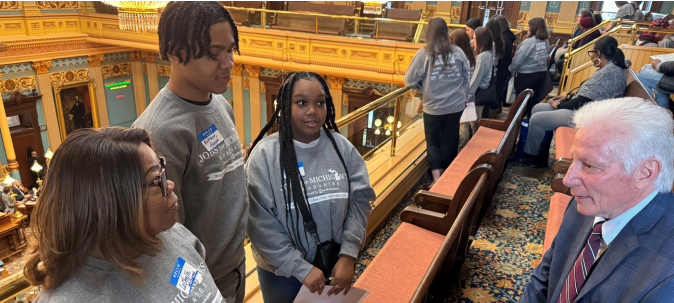
Dear Neighbor,
The 102nd legislative session had been very busy and productive. It’s been my honor to serve as your State Senator during this time and I have had the special privilege to get out in our community and meet many new people throughout the district. At the Capitol, my colleagues and I have been dedicated to continuing the important work of solving problems facing our state, including passing legislation to expand health care, protect voting rights, support working families, and more. In addition, I am proud to have introduced the following bills:
- Senate Bill 40: Unemployment benefits returning to 26 weeks. (Signed into law as Public Act 173 of 2024.)
- Senate Bill 45: Requiring consent for invasive body exams.
- Senate Bill 426: Adjusting the juvenile justice residential per diem rate as needed. (Signed into law as Public Act 300 of 2023.)
- Senate Bill 654: Protecting our children from the dangers of tobacco. • Senate Bills 658 and 1019: Protecting our animals from harmful testing, neglect, and abuse.
- Senate Bill 802 and 918: Increasing access to mental health treatment and resources.
Again, thank you for the opportunity to represent you. I look forward to working with you on these and other important issues during the remainder of my term. If you would like to share your ideas or need assistance regarding state government, please feel free to contact my office.
Warmest regards,

Paul Wojno
State Senator
District 10
Making Michigan Better for Everyone
Improving Access to Mental Health Treatments
Having access to mental health resources and treatments is vital to our community. That is why my colleagues and I introduced Senate Bills 915-918. This four-bill package aims to expand access to assisted outpatient treatment (AOT), which is fundamental to allowing patients to utilize AOT before they need to be hospitalized.
Senate Bill 918, which I introduced, would allow a physician, qualified mental health professional, or other medical personnel to file a petition for a second or continuing order of involuntary mental health treatment at least 14 days before the expiration of a current order of AOT. This is dependent on the individual receiving treatment being likely to refuse voluntary treatment and needing continued treatment.
Additionally, I introduced Senate Bill 802, which expands access to mental health treatment by providing lists of services and resources to those in need.
Advancing Equitable Health Care Access
Michiganders shouldn’t have to worry if they’ll be able to get good health care simply because of where they live or the kind of care they need. That’s why the Senate passed several bills to make health care more accessible and affordable.
Senate Bill 701 will better ensure rural hospitals have the resources necessary to provide quality care to their community. By making this simple change, Michiganders in all parts of the state can access the care they need.
Additionally, Senate Bill 928 and Senate Bill 929 address issues with Medicaid to provide better coverage for all residents and all services. The legislation would require Medicaid to fully cover the costs of giving birth, saving thousands of Michiganders money and time spent on the phone with their insurance provider. The changes this bill makes could fully cover around 66,000 more moms, putting more money back in their pockets so they can pay their bills, buy groceries, and afford child care.
This legislation will also allow Medicaid to cover a broader range of care centers and services for working families in Michigan. This means lowering costs for Michiganders, increasing pay for health care workers, and expanding access tohealth care for more people.
Protecting Kids From Tobacco
Protecting our children from harmful chemicals found in tobacco products is important to my colleagues and me. Senate Bills 647-654 work together to eliminate criminal penalties for youth purchasing tobacco products, prohibit the sale of flavored nicotine vaping products, create a Tobacco Retail License in Michigan, eliminate local preemption for tobacco sale regulations, and level excise taxes on vaping and other tobacco products. I am the sponsor of Senate Bill 654 and a cosponsor of the remaining bills.
Tobacco is the leading cause of preventable disease, disability, and death in Michigan and kills more than 16,200 Michiganders annually. It is important that we prevent our youth from getting hooked on these dangerous products. It is reported that 90% of high school students who vape use flavored products. These bills will not only help to make tobacco products less desirable to children but will also take the penalties away from children. Punishing kids has proven to be an ineffective deterrent to tobacco use.
Preventing Invasive Body Exams & Protecting Bodily Autonomy
The practice of performing invasive examinations on anesthetized patients without informed consent is something that should never happen. That is why I introduced legislation to prevent this from
happening here in Michigan.
Senate Bills 44-45 would prevent a licensee, registrant, or medical student from performing an invasive bodily examination on an anesthetized or unconscious patient unless specified requirements were met. The bills also amend the health code to define “invasive bodily examination” as a pelvic, vaginal, rectal, or prostate examination.
This practice is uncomfortable for both the patient and medical students. Informed consent is vital before such an examination to guarantee patients’ right to bodily autonomy.
Protecting Seniors & Vulnerable Adults Against Abuse
Elder abuse and exploitation are serious and growing concerns for Michigan seniors. To protect older and vulnerable Michiganders from these threats, I joined my colleagues in support of Senate Bills 922-925, which would increase protections by:
- Creating an elder and vulnerable adult personal protection order (PPO).
- Increasing the amount of time prosecutors have to recover property in
embezzlement cases where criminals have taken advantage of vulnerable adults. - Protecting vulnerable adults even after death, treating those offenses the same as
if the exploitation had occurred during the victim’s lifetime. - Taking an all-in approach to preventing, intervening, investigating, and prosecuting abuse, neglect, and financial exploitation of older and vulnerable adults by bringing together local teams of experts.
Juvenile Justice Bill Signed As Public Act 300 Of 2023
On Dec. 29, 2023, Gov. Gretchen Whitmer signed Senate Bill 426, a bill I sponsored that allows the Michigan Dept. of Health and Human Services (MDHHS) to adjust the juvenile justice residential per diem rate as needed. This allows MDHHS to make changes to service agreements to better respond to bed shortages, staff retention, and service needs as long as they can stay within the amount they are provided in the annual budget.
This legislation comes as a result of the Task Force on Juvenile Justice Reform that Gov. Whitmer established in June 2021. The group was charged with analyzing Michigan’s juvenile justice system and recommending changes to state law, policy, and appropriations aimed to transform the system to better position Michigan’s youth for successful adulthoods. It was recommended by the task force that MDHHS be granted statutory authority to adjust per diem rates, which is why I introduced legislation to codify this into state law and improve youth outcomes.
Constituent Corner

Sen. Wojno in the Senate gallery meeting with graduating seniors from Detroit Osborn High School while on their trip to the Capitol.

Sen. Wojno hosting a breakfast with clergy members and leaders from the district.

Detroit Police Chief Todd Bettison and several community leaders meet with Sen. Wojno at an in-district event in Detroit.

Sen. Wojno with members of SMART on their legislative day in Lansing to discuss transportation needs in the community.

Sen. Wojno with members of the Team Up Academy Job Corps program in his office during their day at the Capitol.
Updates on Legislation My bills Signed by the Governor
Grant Secured to Uplift District 10 Residents
I am pleased to announce that I have sponsored several grants that support residents throughout our community, including:
- 7 Mile House Detroit: This $1 million grant was awarded to the 7 Mile House Detroit, a nonprofit organization working to help young people and community members gain mental and physical well-being, as well as a well-rounded view of life with an understanding of their environment and culture.
- Sterling Heights Police Command Vehicle: A $750,000 grant was appropriated to the Sterling Heights Police Department for new police vehicles.
- SMART Transit: This $1 million grant will be used to construct new SMART bus stops and shelters throughout the region, providing vital funding to ensure residents are able to get to the places they need to go safely and efficiently.
- City of Warren Parks and Recreation: A $1 million grant was awarded to the City of Warren’s Parks and Recreation Department to support facility improvements.
Improving Unemployment Benefits
Protecting and looking out for Michigan workers is a priority of my colleagues and mine, which is why the Legislature has enacted Senate Bills 40, 962, 975, 976, and 981. This legislation streamlines Michigan’s Unemployment Insurance Agency (UIA) system and processes and boosts the maximum number of weeks and dollar amount of benefits workers can qualify for.
Notably, this legislation restores Michigan’s own previous practices — and brings us up to par with most other states — by updating the maximum number of weeks people can qualify for benefits. The number of benefit weeks was cut by six weeks in 2011, unnecessarily harming workers when they are struggling the most for more than a decade. The bill also increases the maximum dollar amount of benefits.
I sponsored Senate Bill 40, which restores the maximum number of weeks claimants could access benefits from 20 to 26 and raises the maximum weekly benefit from $362 to $614. With future increases being tied to changes in inflation, this legislation would ensure Michigan’s UIA benefits adapt to a changing economy. The maximum dollar cap for dependent benefits also increased from $6 to $26

Canine Protection Bills
It is pivotal to me that we protect our animals from abuse or neglect. That’s why I introduced Senate Bills 658 and 1019 this year to protect defenseless and vulnerable animals.
Senate Bill 658, along with Sen. Dayna Polehanki’s Senate Bill 657, would provide guidelines and accountability for animal owners when their animals are seized for neglect and abuse. More specifically, Senate Bill 657 prohibits neglect, cruelty, and torturing or killing of an animal. Senate Bill 658 allows a court to order a defendant to pay certain costs when an animal is removed from an abusive or neglectful situation. It also speeds up the timeline for an animal shelter to stabilize the animal and offer it up for adoption.
Additionally, Senate Bill 1019 prohibits painful, taxpayer-funded dog experiments. I introduced this bill in response to the callous dog studies conducted at public universities. Currently, some universities have been conducting hazardous experiments on dogs. These animals have been subject to multiple surgeries, during which devices are placed in and around arteries and inserted into their hearts. Dogs that survive the surgeries are forced to run on treadmills while the implanted devices trigger heart failure. These dogs are also fed high-fat diets, which can increase their risk for stroke. I believe that Michigan public institutions should be held to a higher standard and use public funds to advance human health, not harm and kill dogs.
It is crucial to me that we protect these animals that have no way to defend themselves.
